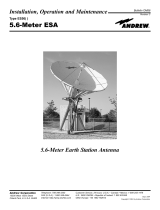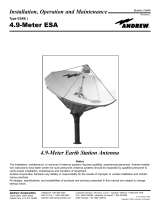Page is loading ...

Assembly and operation manual for TECHNITENNE 60
Item no. EAN Colour
0000/1060 4019588010604 Light gray
0003/1060 4019588310605 Anthracite
1 Usage
The DigitalSat antenna TECHNITENNE 60 is suitable for the re-
ception of the satellite signals in the KU band (10,7 - 12,75 GHz)
of geostationary satellites.
2 Safety instructions
• The antenna and all its parts must not be subjected to the
action of forces that could cause deformation. As a result of
the action of such forces, geometric deformations can occur
which impair the signal reception or result in the antenna
falling down.
• Improper installation of the antenna and lack of mainte-
nance may cause the antenna to loosen and drop at its at-
tachment points.
• The assembly and disassembly of the DigitalSat antenna
must be carried out by qualified personnel. Qualified per-
sons are persons who, due to their training and experience,
have sucient knowledge in the field of SAT system installa-
tion and are familiar with relevant state occupational safety
and accident prevention regulations, guidelines and gener-
ally accepted rules of technology (e.g. VDE regulations, DIN
standards) to can therefore the assess the work-safe condi-
tion of the system
• When mounting the antenna, do not use any other parts
than the originate used by the manufacturer.
3 Assembly
1. Gradually and diagonally screw the reflector ① with the
screws ⑧ on the back plate ② to avoid distortion of the
reflector.
2. Fix the on-pipe fiing ③ with the screws ④ and mount the
mast clamps ⑤ with the parts ⑥ + ⑦.
3. Insert the antenna arm ⑨ through the opening of the re-
flector ① into the back plate ② until it clicks into place.
4. Mount an LNB using the retaining clamp ⑩ and the
screws ⑪
5. Mount the mounted antenna on a special antenna mast,
raer fastener or wall bracket with a maximum pipe diam-
eter of 50 mm.
6. Align the antenna with the satellite.
7. Tighten the nuts on the screws ④ with a torque of maxi-
mum. 7 Nm firmly.
8. Tighten the nuts ⑦ on the mast clamps with a torque of
maximum. 7 Nm firmly.
Aer the antenna has been assembled and the nuts tightened,
it should not rotate, either horizontally or vertically. However
if this is the case, the antenna must under no circumstances
continue used and must be disassembled.
If there are any doubts about the assembly procedure, infor-
mation should be sought from the point of sale or the man-
ufacturer and their instructions followed. Parts of the antenna
set, replaced while the antenna is used, must be of the same
quality as the original parts provided by the manufacturer.
4 Obligation to antenna inspection
At regular intervals, but at least once every 12 months, the user
has to check the fixing of the antenna, whereby an expert tech-
nician who is professionally involved has to be assigned.
It is important to make sure that the antenna parts do not
carry any signs of cracking. For each inspection, check the at-
tachment of all bolts and nuts used in mounting the anten-
na by “tightening” it with the tools intended. In order not to
overwind the threaded, the maximum torque used must not
exceed 7 Nm.
The fier must also check whether the connected elements are
not loose and check for any cracks in them. Defective elements
must immediately be replaced with good ones.
Regardless of the above, inspection of the antenna should also
performed aer a period of strong winds with speed exceed-
ing 80 km/h. It is forbidden to aach any additional elements
to the antenna, its arm and other parts, especially laundry lines,
nets, bird feeders, etc..
!
Information prohibiting further use aer a defect
is founded
If errors are detected at the DigitalSat antenna or any part of
the antenna (such as cracks, corrosion), the user must removal
the antenna and replace it with a faultless one.
If the antenna is still covered by a warranty, information about
such a defect should be sent to the entity which bears liability
in such case. Complaints and any doubts about the correctness
of assembly and use of an antenna should be made at the
place of purchase or sent to the manufacturer.
It is recommended that an DigitalSat antenna and all associat-
ed parts should be replaced aer 10 years at the most.
5 Disposal/Recycling instructions
Electronic equipment must not be disposed of in domestic
waste. According to directive 2002/96/EC OF THE EUROPE-
AN PARLIAMENT AND COUNCIL of 27 January 2003 on waste
electrical and electronic equipment, it must be disposed of
professionally. At the end of its service life, take this device for
disposal at a designated public collection point.
EN
The device bears the CE symbol and complies with all requisite EU standards.
Changes and printing errors reserved..
Duplication and reproduction only with the publisher‘s approval.
TechniSat and TECHNITENNE are registered trademarks of
TechniSat Digital GmbH · TechniPark · Julius-Saxler-Str. 3 · D-54550 Daun
000x/1060 02.2019
/



